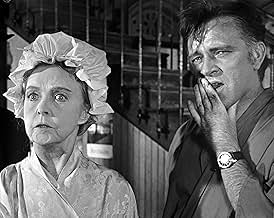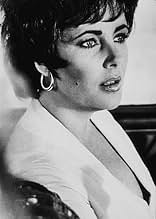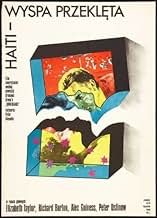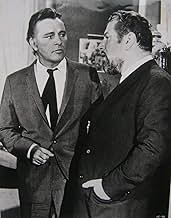Un propriétaire d'hôtel gallois cynique romance secrètement la femme d'un diplomate en Haïti, sous le règne violent du despote « Papa Doc » Duvalier.Un propriétaire d'hôtel gallois cynique romance secrètement la femme d'un diplomate en Haïti, sous le règne violent du despote « Papa Doc » Duvalier.Un propriétaire d'hôtel gallois cynique romance secrètement la femme d'un diplomate en Haïti, sous le règne violent du despote « Papa Doc » Duvalier.
- Prix
- 3 victoires et 1 nomination au total
- Haitian Soldier
- (uncredited)
- Haitian Soldier
- (uncredited)
- Angelito Pineda
- (uncredited)
- César
- (uncredited)
Avis en vedette
The still ravishing Taylor, who affects a German-accent as the wife of Ustinov, a cuckolded foreign ambassador, is involved with Burton, a local hotel owner. While arguably the least-interesting aspect of the film, their liaison is integral to the story. Meanwhile, Paul Ford and his wife, Gish, seek to establish a vegetarian center in Duvalierville, a never-will-be Utopian community, and a shady braggart with the wrong connections, Guinness, attempts an arms sale to Duvalier's henchmen. The visitors, the diplomats, and their local connections are embroiled in Haitian political conflicts and dangerous encounters with Duvalier's thugs, the dreaded Tonton Macoute.
Greene's script is literate, and the performances are effective. The bevy of international stars is enhanced and ably supported by such pros as Paul Ford, Cicely Tyson, Raymond St. Jacques, Roscoe Lee Browne, and George Stanford Brown. Although short on action, "The Comedians" is long on suspense and tension. While the film certainly remains a staple for fans of Taylor and Burton, Glenville's fine production deserves to be seen and appreciated, not only for its lustrous stars, but also for throwing a spotlight on Haiti's nightmarish past.
The Comedians holds one's interest, although it's on the long side. The cast is remarkable: Burton, Alec Guinness, Peter Ustinov, Taylor, James Earl Jones, Lillian Gish, Georg Stanford Brown, Roscoe Lee Brown, and, in a small role, Cicely Tyson. Taylor is very beautiful, although her accent is all over the place. She sounds French in the beginning, then English, then like Elizabeth Taylor, and then in the middle of the movie, we find out she's German.
Though Burton went the schlock for cash route in his career, he was a wonderful, handsome actor with a remarkable voice. Towards the end of the film, he has a scene with Guinness that is well worth the wait - two great actors in a subdued and remarkable scene.
The Haitian scenery belies what lies underneath. It's a film that is perhaps more timely today than it was in 1967.
That's sad, because this is an important film. Since the departure of Duvalier, the film has the added historical value it didn't have in 1967. It is another entry in the canon of Taylor-Burton collaborations. It also may be the only film in which Alec Guinness, Peter Ustinov, Elizabeth Taylor and Richard Burton all appear in together. Plus, how can you trash a film that flaunts its' Haiti exteriors so joyfully?
The vast Panavision photography will be lost on TV screens, especially in the horrific pan and scan format. The best way to see this film is on a big screen and even that may be impossible these days. The title will confuse many (most will think it's about comedians in a comedy club), but it does have a hidden subtext: these people are "comedians" in a sense. They kid each other endlessly to avoid reality. In that context, "The Comedians" succeeds. It could benefit from some trimming, but that's a small complaint. I can't think of anyone else who would even attempt to make such a challenging film in such a chaotic climate.
***1/2 out of 4 stars
"I have no faith in faith," rants Brown (Burton) the anti-hero of the film--a typical Greene character (compare with Greene's 'The Burnt-out case'). Cynicism is turned into comedy. The splashes of Catholic motifs made in passing reference ("defrocked priest") hark back to Burton's earlier role in "Night of Iguana." Guinness' reference to looking like a "Lawrence of Arabia" recalls his own role as Prince Faisal in Lean's movie. Not having read Greene's book, I am not sure whether Greene introduced these clever details into the script to suit the actors or whether the details had previously existed in the book.
The gradual unmasking of the Major (Guinness) is a treat creatively captured by Glenville and Greene. The final speech made by Burton to his group of ragged rebels seem to have a common "comic" thread with George Clooney's speech to his soldiers towards the end of the recent Mallick's "The Thin Red Line".
Ustinov's diplomat and Taylor's vulnerable diplomat's wife, who admits to her lover that he is the fourth "adventure," are both comedians--Greene's likable misfits who cannot change their destiny and are strangely reconciled to accept their inevitable end. All the four main characters are "prepared" for their destiny they have designed for themselves as a consequence of previous actions in life. The closing shot of the film is a shot of a suggestive blue sky, redeeming the foibles of the comedians on terra firma.
I admit that when I saw the film some 20 years ago, I did not appreciate the film as I do now. I was missing the forest for the trees. This film does not belong to Burton, Taylor, Guinness, Ustinov, Jones or Lillian Gish. It belongs to Greene, Glenville and the French cinematographer Henri Decae.
I do not imply that Burton was not good--but George C Scott said one should evaluate a performance by remembering the character more than the actor. It is in that context that I remember the four main characters. Burton's kisses are different here than say in "Boom" or "Cleopatra"--only to add detail to the character. Taylor is strangely subdued only to add power to her smoldering role. Guinness gradual unmasking is pathetic yet endearing only to add more substance to the character. Decae's camera captures details that shocks--e.g., empty drawers in desks to collect bribes, public executions of rebels watched by school kids...
I am surprised that this film, to my limited knowledge, has never been taken seriously for what it offers--a superb script, commendable acting, good direction, and some fine camera-work.
Le saviez-vous
- AnecdotesSeveral critics noted that the ending of this movie is at least a little more positive and optimistic than the bleak ending of Graham Greene's original novel, and attacked the movie for "softening" the subject. Graham Greene, however, insisted that the more upbeat ending had been his own idea.
- GaffesIn the last few shots in the movie, as the Character is leaving the airport, there is initially a departing Vickers VC10 airliner flying overhead from right to left, this changes to a close up, followed by a shot of the same airliner now flying into the distance - unfortunately this is different 4 engine Jetliner, probably a Boeing 707.
- Citations
Brown: I don't believe in causes.
Dr. Magiot: The role of cynic doesn't really suit you, Brown.
Brown: I don't believe in play-acting either.
Dr. Magiot: You imagine because you've lost one faith, you've lost all? You're wrong, Brown. There is always an alternative to the faith we lose.
Brown: I have no faith in faith.
- ConnexionsFeatured in The Comedians in Africa (1967)
Meilleurs choix
- How long is The Comedians?Propulsé par Alexa
Détails
Box-office
- Brut – États-Unis et Canada
- 5 200 000 $ US
- Durée2 heures 30 minutes
- Mixage
- Rapport de forme
- 2.35 : 1
Contribuer à cette page




































